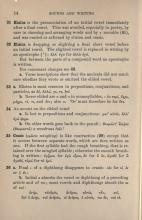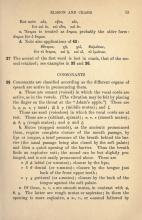35. Crasis (κρᾶσις mingling) is like contraction (§ 29) except that it occurs between separate words, which are then written as one. If the first syllable had the rough breathing, that is retained over the mingled syllable; otherwise the smooth breathing is written.
36. a. Final -ι of a diphthong disappears in crasis.
b. Initial α- absorbs the vowel or diphthong of a preceding article and of τοι; most vowels and diphthongs absorb the αι οf καί.
| ᾱ̔νήρ | τᾱ̓νδρός | ᾱ̔́νδρες | αὑτός | τᾱ̓́ν | κεἰ |
| for | |||||
| ὁ ἀνήρ | τοῦ ἀνδρός | οἱ ἄνδρες | ὁ αὐτός | τοι ἄν | καὶ εἰ |
But note
κᾱ̓ς for καὶ ἐς
κᾆτα for καὶ εἶτα
κᾱ̓ν for καὶ ἐν
c. Ἕτερος is treated as ἅτερος, probably the older form.
ᾱ̔́τερος for ὁ ἕτερος
d. Note also applications of § 42.
37. The accent of the first word is lost in crasis, that of the second retained; see examples in §§ 35 and 36 (above).


